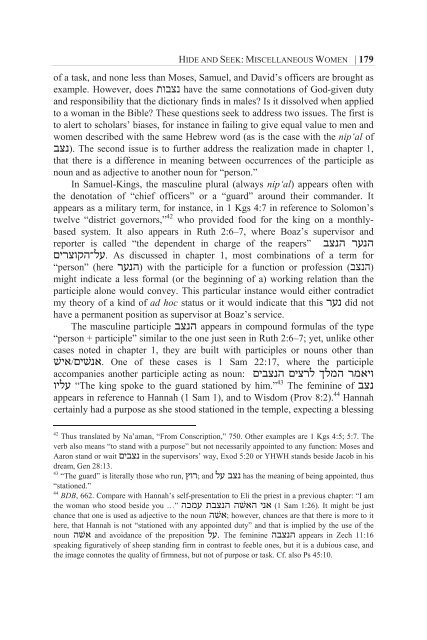Women at Work in the Deuteronomistic History - International Voices ...
Women at Work in the Deuteronomistic History - International Voices ...
Women at Work in the Deuteronomistic History - International Voices ...
You also want an ePaper? Increase the reach of your titles
YUMPU automatically turns print PDFs into web optimized ePapers that Google loves.
HIDE AND SEEK: MISCELLANEOUS WOMEN | 179<br />
of a task, and none less than Moses, Samuel, and David’s officers are brought as<br />
example. However, does תובצנ have <strong>the</strong> same connot<strong>at</strong>ions of God-given duty<br />
and responsibility th<strong>at</strong> <strong>the</strong> dictionary f<strong>in</strong>ds <strong>in</strong> males? Is it dissolved when applied<br />
to a woman <strong>in</strong> <strong>the</strong> Bible? These questions seek to address two issues. The first is<br />
to alert to scholars’ biases, for <strong>in</strong>stance <strong>in</strong> fail<strong>in</strong>g to give equal value to men and<br />
women described with <strong>the</strong> same Hebrew word (as is <strong>the</strong> case with <strong>the</strong> nip‘al of<br />
בצנ). The second issue is to fur<strong>the</strong>r address <strong>the</strong> realiz<strong>at</strong>ion made <strong>in</strong> chapter 1,<br />
th<strong>at</strong> <strong>the</strong>re is a difference <strong>in</strong> mean<strong>in</strong>g between occurrences of <strong>the</strong> participle as<br />
noun and as adjective to ano<strong>the</strong>r noun for “person.”<br />
In Samuel-K<strong>in</strong>gs, <strong>the</strong> mascul<strong>in</strong>e plural (always nip‘al) appears often with<br />
<strong>the</strong> denot<strong>at</strong>ion of “chief officers” or a “guard” around <strong>the</strong>ir commander. It<br />
appears as a military term, for <strong>in</strong>stance, <strong>in</strong> 1 Kgs 4:7 <strong>in</strong> reference to Solomon’s<br />
twelve “district governors,” 42 who provided food for <strong>the</strong> k<strong>in</strong>g on a monthlybased<br />
system. It also appears <strong>in</strong> Ruth 2:6–7, where Boaz’s supervisor and<br />
reporter is called “<strong>the</strong> dependent <strong>in</strong> charge of <strong>the</strong> reapers” בצנה רענה<br />
םירצוקה־לע. As discussed <strong>in</strong> chapter 1, most comb<strong>in</strong><strong>at</strong>ions of a term for<br />
“person” (here רענה) with <strong>the</strong> participle for a function or profession (בצנה)<br />
might <strong>in</strong>dic<strong>at</strong>e a less formal (or <strong>the</strong> beg<strong>in</strong>n<strong>in</strong>g of a) work<strong>in</strong>g rel<strong>at</strong>ion than <strong>the</strong><br />
participle alone would convey. This particular <strong>in</strong>stance would ei<strong>the</strong>r contradict<br />
my <strong>the</strong>ory of a k<strong>in</strong>d of ad hoc st<strong>at</strong>us or it would <strong>in</strong>dic<strong>at</strong>e th<strong>at</strong> this רענ did not<br />
have a permanent position as supervisor <strong>at</strong> Boaz’s service.<br />
The mascul<strong>in</strong>e participle בצנה appears <strong>in</strong> compound formulas of <strong>the</strong> type<br />
“person + participle” similar to <strong>the</strong> one just seen <strong>in</strong> Ruth 2:6–7; yet, unlike o<strong>the</strong>r<br />
cases noted <strong>in</strong> chapter 1, <strong>the</strong>y are built with participles or nouns o<strong>the</strong>r than<br />
שׁיא/םישׁנא. One of <strong>the</strong>se cases is 1 Sam 22:17, where <strong>the</strong> participle<br />
accompanies ano<strong>the</strong>r participle act<strong>in</strong>g as noun: םיבצנה םיצרל ךלמה רמאיו<br />
וילע “The k<strong>in</strong>g spoke to <strong>the</strong> guard st<strong>at</strong>ioned by him.” 43 The fem<strong>in</strong><strong>in</strong>e of בצנ<br />
appears <strong>in</strong> reference to Hannah (1 Sam 1), and to Wisdom (Prov 8:2). 44 Hannah<br />
certa<strong>in</strong>ly had a purpose as she stood st<strong>at</strong>ioned <strong>in</strong> <strong>the</strong> temple, expect<strong>in</strong>g a bless<strong>in</strong>g<br />
42 Thus transl<strong>at</strong>ed by Na’aman, “From Conscription,” 750. O<strong>the</strong>r examples are 1 Kgs 4:5; 5:7. The<br />
verb also means “to stand with a purpose” but not necessarily appo<strong>in</strong>ted to any function: Moses and<br />
Aaron stand or wait םיבצנ <strong>in</strong> <strong>the</strong> supervisors’ way, Exod 5:20 or YHWH stands beside Jacob <strong>in</strong> his<br />
dream, Gen 28:13.<br />
43 “The guard” is literally those who run, ץור; and לע בצנ has <strong>the</strong> mean<strong>in</strong>g of be<strong>in</strong>g appo<strong>in</strong>ted, thus<br />
“st<strong>at</strong>ioned.”<br />
44 BDB, 662. Compare with Hannah’s self-present<strong>at</strong>ion to Eli <strong>the</strong> priest <strong>in</strong> a previous chapter: “I am<br />
<strong>the</strong> woman who stood beside you …” הכמע תבצנה השׁאה ינא (1 Sam 1:26). It might be just<br />
chance th<strong>at</strong> one is used as adjective to <strong>the</strong> noun השׁא;<br />
however, chances are th<strong>at</strong> <strong>the</strong>re is more to it<br />
here, th<strong>at</strong> Hannah is not “st<strong>at</strong>ioned with any appo<strong>in</strong>ted duty” and th<strong>at</strong> is implied by <strong>the</strong> use of <strong>the</strong><br />
noun השׁא and avoidance of <strong>the</strong> preposition לע. The fem<strong>in</strong><strong>in</strong>e הבצנה appears <strong>in</strong> Zech 11:16<br />
speak<strong>in</strong>g figur<strong>at</strong>ively of sheep stand<strong>in</strong>g firm <strong>in</strong> contrast to feeble ones, but it is a dubious case, and<br />
<strong>the</strong> image connotes <strong>the</strong> quality of firmness, but not of purpose or task. Cf. also Ps 45:10.




